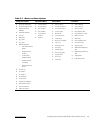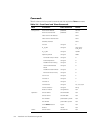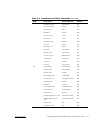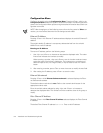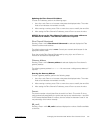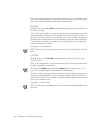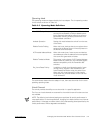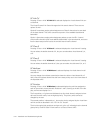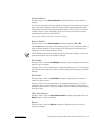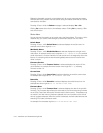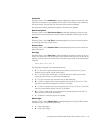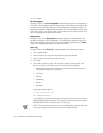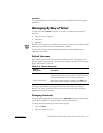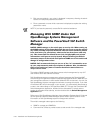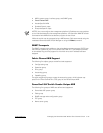
3-12 Installation and Troubleshooting Guide
'
Pressing <Enter> while VC Link Ctl is selected displays the virtual channel link con-
trol channel.
The Virtual Channel Link Control changes the link control channel. There are two
options: 0 and 1.
Option 0 forces data receipt acknowledgments on Class 2 channels to be sent back
on the data channel. This traffic consumes a portion of the available data channel
bandwidth.
Option 1 allows data receipt acknowledgment packets to use the VD-1 (internal
switch traffic channel) which frees additional bandwidth in the data channel, and trans-
fers the data receipt traffic load to the switch’s internal traffic channel.
' )
Pressing <Enter> while VC Class 2 is selected displays the virtual channel 2 setting.
You can select the default channel of 2, but you can also select virtual channel 3, 4,
or 5.
' *
Pressing <Enter> while VC Class 3 is selected displays the virtual channel 3 setting.
You can select the default channel as 3, but you can select virtual channel 2, 4, or 5.
' (
Pressing <Enter> while VC Multicast is selected displays the virtual channel multi-
cast channel.
You may change the multicast transmission channel to either virtual channel 6 or 7.
Verify that the multicast channel has the frame class priority set to the frame class of
the expected traffic.
'
Pressing <Enter> while VC Muticast is selected displays the priorities assigned to
each of the switch’s virtual channels. Positions 1 and 2, starting at the left of the dis-
play, are fixed and display 0 or 1.
The first position, a 0 ,shows and indicates that this virtual channel, assigned to han-
dle internal switch traffic, has the highest priority. This priority value cannot be
changed by the user.
The second position, indicated by a 1, shows the priority assigned by the virtual chan-
nel link control as described in the “VC Link Ctl” section.
The third through eighth positions can have only a 2 or a 3 indicating that the channel
gives priority to either Class 2 frame traffic or to Class 3 frame traffic.




